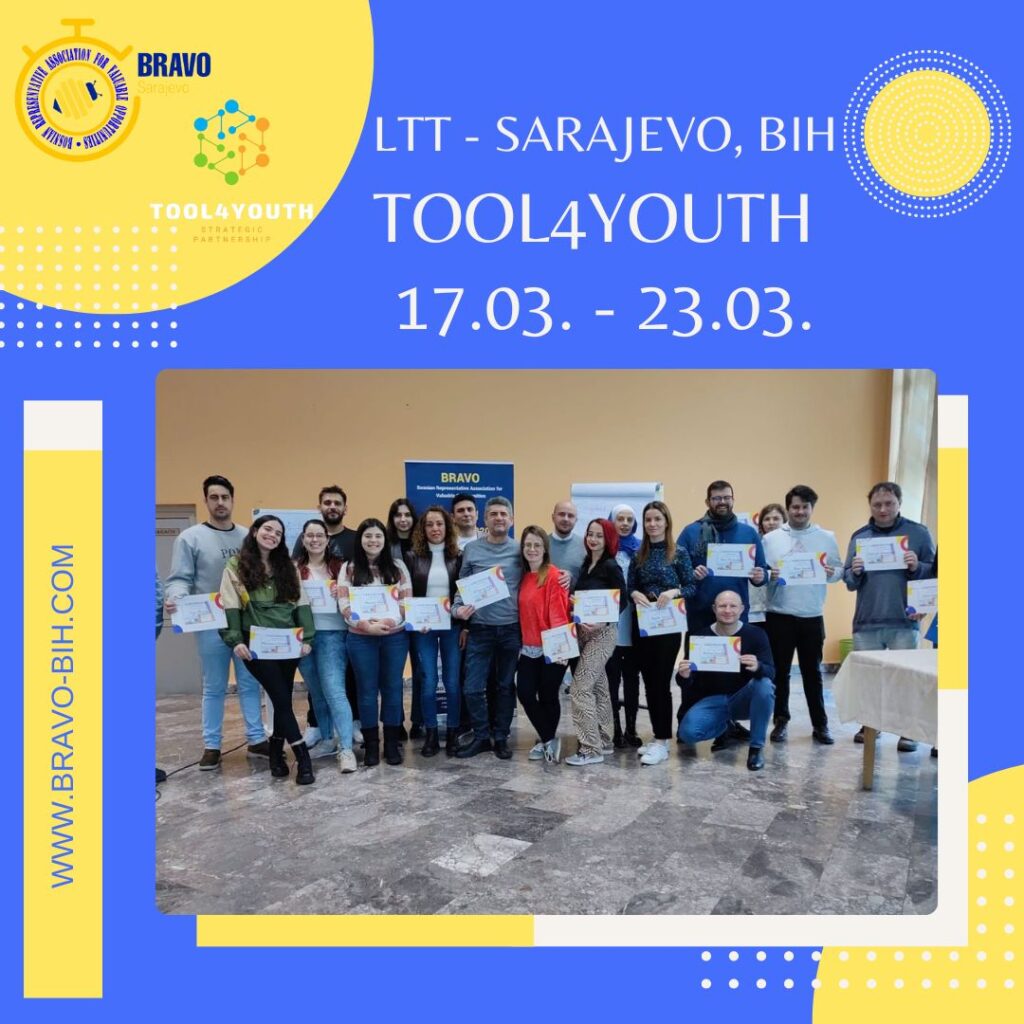
We are excited to announce that the LTT “TOOL4YOUTH” course has come to an end. With this training course we increased the awareness and skills of recognizing fake news of the participants of the partner organizations.
In the period from 17.03. until 23.03.2023. BRAVO had the opportunity to host 24 young people from five countries, who learned about digital tools, arts of recognizing fake news and much more.
Over those days, participants were able to dive into the world of digital tools while also taking some time to explore the stunning city of Sarajevo as well as Konjic and Mostar as part of their study visits. Throughout the journey, they were able to appreciate the rich culture and history of Bosnia and Herzegovina.
The participants had a chance to be introduced to the implemented project activities, they had discussions about key digital competences, they wrote scenarios for a comic strip and took care of the comics visual design.
These young people also had a chance to listen to a lecture on the topic of fact checking by Nerma Šehović from raskrinkavanje.ba as well as a study visit to CIN BiH alongside director Leila Bičakčić. We want to thank the raskrinkavanje.ba and CIN collective once again for their help in implementing important study visits for this project.
Not only did the participants learn new useful things, but they also got to bond and spend some quality time together, which was essential for building team morale and improving collaboration. By engaging in activities outside of coursework, they were able to strengthen connections and create beautiful memories.
AIM OF THE PROJECT
The coronavirus disease (COVID -19) is the first pandemic in history to use technology and social media on a large scale to keep people safe, informed, productive, and connected. At the same time, the technology we rely on to stay connected and informed is enabling and amplifying an infodemic that continues to undermine the global response and compromise pandemic control measures. An infodemic is an overabundance of information, both online and offline. It is a deliberate attempt to spread false information in order to undermine the public health response and promote alternative agendas by groups or individuals. Misinformation and disinformation can harm people’s physical and mental health, increase stigma, jeopardize valuable health gains, and lead to poor adherence to public health interventions, reducing their effectiveness and jeopardizing countries’ ability to stop the pandemic. Misinformation costs lives. Without the necessary confidence and the right information, diagnostic tests will go unused, vaccination campaigns (or campaigns to promote effective vaccines) will not achieve their goals, and the virus will continue to spread. Moreover, disinformation polarizes public debate on issues related to COVID -19, amplifies hate speech, increases the risk of conflict, violence and human rights abuses, and threatens the long-term prospects for promoting democracy, human rights and social cohesion. The digital age has made it easy for anyone to create media. We don’t always know who created something, why they made it, and whether it’s credible. This makes media literacy tricky to learn and teach. Nonetheless, media literacy is an essential skill in the digital age.
OBJECTIVES OF THE PROJECT
Our most related priority is to promote media literacy and to raise awareness about the false information that is present on a daily basis around the world. We believe that working with youth and youth workers we will take great attention to this issue to the wider community. As we need to make awareness of this global issue.
The main objectives are:
- to increase awareness on what news are fake, and which resources are not trustworthy
- to create a common consciousness to change the societies habits on believing in everything they hear or read
- to promote EU funding projects to the wider community.
- to raise awareness of youth education and its deep effects at local, national and international levels.
- to enhance media literacy skills of youth
- to improve design thinking, creativity, adaptability, resilience, and even empathy.
- to develop communication, teamwork, digital literacy, analyzing, and research skills.
- to create innovative ideas, questioning and problem-solving skills.
- to reach 2000 people with our project and make awareness in the wider community.
- to hand in our production result e-toolkit – comic strip to 1000 people.
- to reach 100 people with Multiplier events
